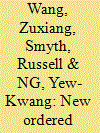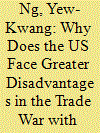| Srl | Item |
| 1 |
ID:
089556


|
|
|
|
|
| Publication |
2009.
|
| Summary/Abstract |
The most common data source on income distribution in China is grouped data. When income data is in grouped form, some acceptable Lorenz model is needed to approximate the underlying Lorenz curve. This paper presents a new family of Lorenz curves and applies the main model in our proposed family of Lorenz curves to income data for rural China over the period 1980 to 2006. We find that the income share of the rural population at the low end of the income scale has been shrinking, income inequality in rural China has increased over time and that income inequality has impeded attempts to reduce poverty. However, the welfare of the rural population is still improving in terms of the generalized Lorenz dominance criterion.
|
|
|
|
|
|
|
|
|
|
|
|
|
|
|
|
| 2 |
ID:
171889


|
|
|
|
|
| Summary/Abstract |
The rhetoric used by President Trump regarding the trade war against China is rife with misinterpretation. The actual American trade decit with China is much lower if evaluated in the correct terms of value-added. The decit is mainly a result of insufcient domestic US savings. In addition, as the US dollar is an international currency which is being increasingly held as a result of increases in world population, income, prices and transaction intensity, Americans can benet from having trade decits of hundreds of billions of US dollars each year. My analysis, as well as a model of the Bank of England, reveals that the trade war is not only mutually harmful but also actually hurts America more than China. The Thucydides Trap is likely avoidable in the current nuclear era of assured mutual destruction and because China, facing many structural impediments, is still far behind America in technology and military power.
|
|
|
|
|
|
|
|
|
|
|
|
|
|
|
|